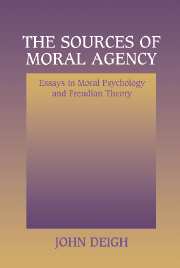Book contents
- Frontmatter
- Contents
- Preface
- Sources
- Abbreviations
- Dedication
- 1 Morality and personal relations
- 2 On the right to be punished: Some doubts
- 3 Love, guilt, and the sense of justice
- 4 Remarks on some difficulties in Freud's theory of moral development
- 5 Freud's later theory of civilization: Changes and implications
- 6 Freud, naturalism, and modern moral philosophy
- 7 Reason and motivation
- 8 Empathy and universalizability
- 9 Sidgwick on ethical judgment
- 10 Reason and ethics in Hobbes's Leviathan
- 11 Shame and self-esteem: A critique
- Index
3 - Love, guilt, and the sense of justice
Published online by Cambridge University Press: 04 December 2009
- Frontmatter
- Contents
- Preface
- Sources
- Abbreviations
- Dedication
- 1 Morality and personal relations
- 2 On the right to be punished: Some doubts
- 3 Love, guilt, and the sense of justice
- 4 Remarks on some difficulties in Freud's theory of moral development
- 5 Freud's later theory of civilization: Changes and implications
- 6 Freud, naturalism, and modern moral philosophy
- 7 Reason and motivation
- 8 Empathy and universalizability
- 9 Sidgwick on ethical judgment
- 10 Reason and ethics in Hobbes's Leviathan
- 11 Shame and self-esteem: A critique
- Index
Summary
Freud once wrote that the sense of guilt was “the most important problem in the development of civilization.” Presumably, he would have agreed with a parallel statement about the socialization of the child. How a child acquires moral sensibilities, a sense of guilt, a sense of duty, a sense of justice, is one of the main questions of moral psychology. Philosophers interested in moral psychology, to be sure, would start with a different question. They would ask about something called the nature of these sensibilities and follow this with some such series of questions as, how are we to understand the moral motives that spring from them, in what do the emotions and feelings that mark one as having them consist, are they akin to an intellectual sense like mathematical intuition or more like a perceptual sense such as that of sight, or are they yet something entirely different? and so on. These are typical philosopher's questions. They do not, however, set philosophers at any great distance from research psychologists. Freud speaks as much to the one as to the other.
Indeed, the concerns of each overlap in many areas the concerns of the other. In particular, whether one studies psychological concepts or psychological processes, one must consider questions about the connections between, on the one hand, moral sensibilities and the motives and emotions originating in them and, on the other, the intellectual and emotional capacities and dispositions with which human beings are naturally endowed.
- Type
- Chapter
- Information
- The Sources of Moral AgencyEssays in Moral Psychology and Freudian Theory, pp. 39 - 64Publisher: Cambridge University PressPrint publication year: 1996



